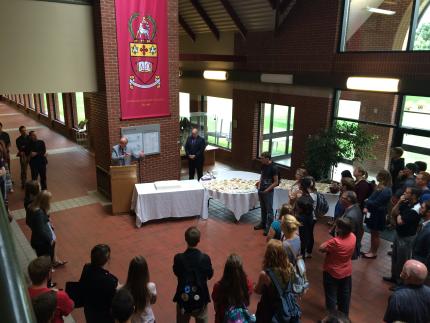Redeemer University College Launches New Liberal Arts Core Curriculum

People gather for launch of new program at Redeemer University College.
Dan Galenkamp, Redeemer University College
On September 14, Redeemer University College launched a new core curriculum that they believe will better prepare their students for the future.
Students, faculty, alumni, and supporters gathered at Redeemer’s campus in Ancaster, Ont. last Wednesday to witness and celebrate the official curriculum launch.
Hubert Krygsman, President of the university, spoke to the crowd about his hope for this exciting new chapter in Redeemer’s story.
“I think these developments are really vital and extremely valuable and exciting for our students – and that’s what excites me,” said Krygsman.
Rather than being framed as an encyclopedia of disciplines the new core curriculum begins with the student experience itself, Krygsman explained.
“We want students to deepen their faith, to develop a truly transformed understanding of the world, to understand the main contours of the world in which we live and are called to serve, and in doing so, also to discover their calling.”
The core consists of 10 courses that all students will take, such as the Drama of Scripture, Western Culture and Tradition, Being and Knowing in the Digital Age, and Non-Western Perspectives.
Darren Brouwer, associate professor of chemistry, explained that the new program differs from the previous core curriculum in that it’s more focused and cohesive. The previous core, like many liberal arts cores, required courses from various disciplines, but they were generally introductory-level courses, and didn’t necessarily relate to a greater theme.
“In the new core,” said Brouwer, “we have courses that are specifically designed for the core. This will allow us to be much more intentional about what we want students to learn in these courses and ensure that these courses integrate and cohere with the other core courses they are taking – and in their major.”
Brouwer acknowledged that there is a trend in education toward specific career training, but added that Redeemer sees value in a broad liberal arts and sciences education, which can equip students for a variety of careers, callings, and job paths that may not even exist yet.
“We’re convinced that educating the whole person is of tremendous importance. We want to invest in shaping students to be a certain type of person, rather than simply and only providing job training.”
In a speech at a reception after the public launch, alumna Kristel Bulthuis related how the core curriculum that existed at Redeemer when she studied there changed the course of her life. It revealed new interests that encouraged her to grow and become well-rounded.
“When I entered Redeemer…I had no idea that 14 years later I would not be in [my intended career] at all, but in a career I didn’t even know existed. I was given the room and the freedom to find different sides of myself,” she said.
Bulthuis had planned to work in long-term care and recreation. She is now communications and operations coordinator with a developer in downtown Hamilton, Ont.
The new Redeemer program took about three years to develop. It began with surveying alumni, current students, faculty, staff, and administration about the old core curriculum as well as gathering suggestions for a new core.
Next, ideas were developed into a set of learning outcomes, and 10 courses were identified that would fulfil these goals. The third year saw interdisciplinary teams of faculty members coming together to implement the goals and develop the specifics of the courses.
The new program is being phased in, with this year’s first-year students as the first group to move through the program.
Third year student Noah Van Brink said, “I think it’s very exciting…. I wish I’d been able to take this stuff. I think it’s true when they say that they’re preparing students in a way that very few institutions do, especially in a very challenging world where there are lots of different problems to solve and they’re all interconnected – that you can’t address them with one discipline. I think it’s brilliant, personally.”
That enthusiasm is reflected in the faculty as well. Ben Faber, assistant professor of English, noted in a speech: “We’ve been committed to serving the students through this unified set of courses from year one to year four…We’re very excited to see this up and running.”
Ray Louter, a professor of Theatre Arts & Communication, agreed, saying, “I think the core-curriculum-building exercises the faculty did last summer and this past summer is some of the most positive stuff that we faculty have ever done together.
“It was enjoyable, it was collaborative, it involved some pushing and shoving, it was creative – and I think many of us really like what we see on paper. The art of it will be teaching it in the classroom and managing it hereafter.”


